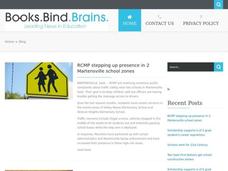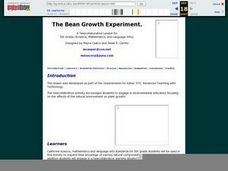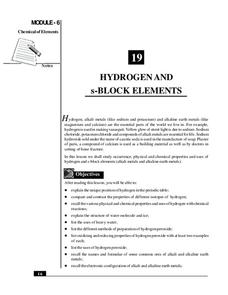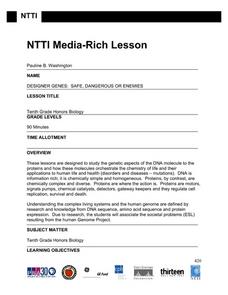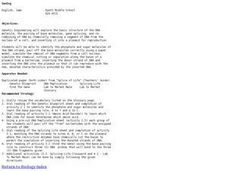Serendip
Food, Energy and Body Weight
High schoolers learn why humans need calories, how they control weight with food choices, and the impact of exercise on energy. Scholars then apply their understanding to a case study of lunch choices and exercise.
Serendip
Soap Opera Genetics – Genetics to Resolve Family Arguments
Did she cheat on her husband? Did the hospital switch the babies? Should they have children? As much as this sounds like the plot for a soap opera, all of these questions fit into a single lesson on genetics. Scholars read about three...
Curated OER
Diversity of Life
Pupils study the classification of viruses and describe their structure. In this investigative lesson students complete an activity and answer questions about viruses.
Curated OER
The Water Cycle
Students list the nine places on earth where water is found. They define the terms cycle and water cycle. Students explain how energy from the sun powers the movement of water molecules through the water cycle. They name and describe...
Curated OER
To Smell or Not to Smell, That is the Ester
Students explain the basic concepts of polymerization. Students participate in a lab to create a crude preparation of carboxyl esterase and test its effectiveness in reducing the residual monomer in an emulsion such as paint.
Curated OER
Carbon: Structure Matters
Students read the Who We Are Section on Calfee Designs Webpage and discuss carbon usage. They work in pairs to look up the minerals diamond and graphite then create a chart on the properties of each mineral then compare how they differ...
Curated OER
DNA and RNA
Tenth graders research the history and discovery of DNA. Using their text, they label a basic DNA structure and the composition of genes. They explain how RNA and DNA differ from one other and discuss the processes of transcription and...
Curated OER
Polymerase Chain Reaction and DNA Profiling
Students examine DNA fingerprinting and polymerase chain reaction and how they are used in everyday life and for criminal investigations. They discover how these techniques can also be used to answer ecological and evolutionary questions.
Curated OER
It's the Slime Time
Students experiment to understand the basic concept of polymerization and to understand the dissolution theory. Student experiment with polymers to understand its behavior and the mechanical behavior of polymer networks.
MOST
What Are Cells?
What's in a cell, anyway? Kids read informational text on what makes up both animal and plant cells, including a page of vocabulary terms they will need to be familiar with (cytoplasm, ribosomes, vacuoles, etc.). Full-color images make...
Curated OER
Habitable Zones
Students focus on stellar luminosities to estimate size of habitable zones, map out habitable zone around hot light bulbs that serve as models of stars, investigate how size of model "habitable zone" around light bulbs depends on...
Curated OER
Structure and Function of the Cell/Introduction to the Cell
So, this is not technically a learning exercise, but rather a chapter of reading material, pictures, and diagrams introducing young biologists to the cell. Cell theory, diversity, size, and shape are described. The internal organization...
Curated OER
The Bean Growth Experiment
Fifth graders use modern technologies which allow them to gain a new, dynamic, and intersting understanding of themselves, their community, and the world. They focus on environmental education and the effect of the environment on plant...
Curated OER
Semipermeable Membranes and Bioaccumulation
Beginning biologists place a drop of food coloring into water of differing temperatures to observe the effect on the diffusion rate. They remove the shells from raw eggs and then experiment with osmosis over the remaining membranes....
National Institute of Open Schooling
Hydrogen and s-Block Elements
Lesson 19 in the series of 36 analyzes the element hydrogen and the s-block elements. Through readings, answering questions, and discussion, learners write about and explain their occurrence, physical and chemical properties, and uses.
University of Georgia
Flavor of Organic Chemistry
Introduce organic chemistry through an analysis of flavor. A three-part unit begins with an overview of the components of flavor. Next, scholars prepare esters through esterification. Finally, they examine how all senses have an impact...
Curated OER
Carbon Cycle Capers
Students examine the carbon dioxide cycle in the atmosphere. In this element lesson, students discuss the relationship between carbon dioxide on Earth and the plants that store it. Students play a game to ensure their understanding.
Curated OER
Temperature and the Tomato
You will need a photovoltaic system and monitor at your school in order to obtain all of the data required to thoroughly implement this instructional activity. Your class monitors daily temperature and insolation amounts over a two week...
Curated OER
Mapping the Human Genome
Students study DNA and how it was discovered. In this biology lesson students see the effects of mapping the human genome would have.
Curated OER
The Science of Respiration and Blood Circulation
Fifth graders study how respiration and circulation are connected. In this respiratory lesson students complete several activities to better understand heart rate and carbon dioxide in the body.
Curated OER
Acids and Bases
In this acids and bases worksheet, students complete 32 fill in the blank and short answer questions on acidity or alkalinity. They color molecular diagram according to the key.
Curated OER
GenEng
Students investigate the process of genetic engineering. In this genetic engineering lesson plan, students use paper models of DNA and plasmid bacterium to investigate the process of replicating DNA, splicing genes from DNA, and...
Curated OER
Yeast Bread: Final Evaluation Project
Identify and prepare yeast breads. National Standard 14.3.3 Identify the classes of breads: rolls, loaves, deep-fat fried Identify ingredients in yeast breads and their functions: flour, yeast, liquid, salt, sugar, fat and eggs Identify...
Curated OER
Polymerization Experiments
Students study the concepts of polymerization and the function of crosslinkage. In this polymer lesson plan students complete a lab activity and write down their observations.




